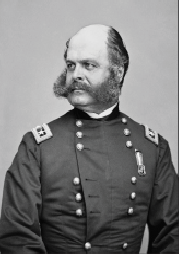A beard’s history in the United States
May 27, 2015
The current trend says beards are in, but that hasn’t always been the case in America.
History Professor Brian Carroll, while not an expert on the subject of beards, offered a brief history of beards in the U.S.
Carroll said the origin of facial hair in America can be traced back to a cultural divide.
“For most of the 1700s, facial hair was completely out of fashion and hardly anybody wore it,” Carroll said. “If you did see people wearing facial hair, they were usually depicted as barbaric.”
No group of people exemplify this better than the rugged frontiersmen of the 1700s and early 1800s.
“Hunters and fur traders were always depicted as having beards,” Carroll said. “Frontiersmen weren’t really respected, and they held a very low position within their communities. It was a sign of being uncivilized.”
The negative connotations associated with beards began to dissipate when Americans began to embrace rugged outdoors men as heroes.

“Society began to celebrate men like Davy Crockett and Daniel Boone. From then on, having a beard was seen as manly, not disparaging,” Carroll said.
Carroll also noted that it was ironic for society to classify bearded men as barbaric in the early 1800s, as racism against Native Americans was a major societal problem.
“Indians were always considered the ultimate savages, but they didn’t have beards,” Carroll said.
Most tribes plucked all of their body hair, but there was an emphasis on elaborate hairstyles, such as long, decorated braids.
During the American Civil War, beards made a comeback. Generals sported well manicured beards on the battlefield, like Ambrose Burnside who led the Union Army while donning huge mutton chops.
“The start of the Civil War through the 1890s was definitely the heyday of American facial hair,” Carroll said.
The peak of beards’ popularity in the 20th century was during the 1960s and 70s.
Carroll said that men grew beards to rebel against the clean cut look of the times.
“This is the first time we see beards grown as a rebellious statement,” Carroll said.
When it comes to the future of facial hair, Carroll believes that we are experiencing a new heyday thanks to the popular hipster beard craze. Carrol said the trend is ambiguous in its statement- are hipsters attempting to be manly, or just wearing beards to make fun of manliness?
Ultimately, Carroll believes that beards will always be a part of American culture.
“Historians are typically pretty bad at predicting the future, but we do know that trends come and go,” Carroll said. “The world is more connected now than ever, so trends tend to move quickly.”

Brian Carroll • Jun 8, 2015 at 10:26 am
Really surprised this piece is still up as I sent an email request to the editor to have it taken down. Here was my response to the piece on the CWU History Dept. Facebook page:
“FYI. Professor Carroll who is teaching a course “American Manhood in Historical Perspective” was recently interviewed by an Observer reporter about the history of beards and facial hair in America. The article the reporter wrote was very poorly done. So much so, that Professor Carroll has demanded, in writing, a retraction from the Observer as the article misquotes him numerous times and the writer confused and misinterpreted just about every thing he said. The reporter failed to do any additional research on the topic, completely garbled the information that Professor Carroll did provide, and made numerous other mistakes in the piece. You can do better Observer.”
As per my email request PLEASE TAKE THIS PIECE DOWN. Immediately.